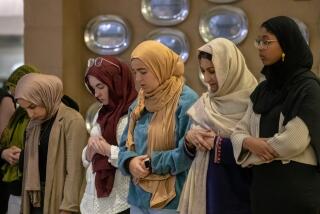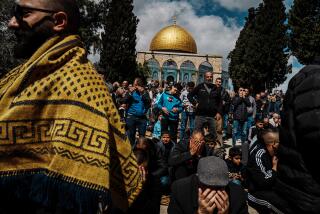COMMENTARY : As Islam Grows, It Remains Misunderstood
- Share via
WASHINGTON — For many years, I have belonged to a luncheon group here--a group kept purposely small but dedicated to international understanding and friendship. We meet on the fourth Monday of each month, but we often have to adjust the date.
Because some members are congressional wives, we must take the congressional recesses into account. Then there are the Christmas and Easter holidays. And for the last 10 years or so, we have also tried not to conflict with the Jewish High Holy Days.
And now, this month, our meeting date runs into the first day of Ramadan Monday, creating a problem for our member from Egypt. Fasting from sunup to sunset during this 30-day period is, like the daily prayers, one of the major duties of a Muslim.
Not too long ago, most of our members had never heard of Ramadan. Yet it is estimated that up to 6 million Americans may join Muslim diplomatic households like hers in the observance.
Islam, the religion of the followers of Mohammed, is said to be the fastest-growing religion in this country. In the 1950s the ambassadors of 15 Muslim countries joined together to build a handsome mosque, a place of worship and an Islamic Center in Washington. Today, there are similar places of worship in Los Angeles, Chicago and New York and meeting places in other cities as well.
“Each week numbers of Americans from all walks of life adopt the Muslim faith,” says Hamud Magid, librarian of the Islamic Center. Most of us, however, know little of the religion that is so steadily attracting new adherents. We think of it, if we think of it at all, as a religion of strangers among us. Many Americans also view Islam as a religion that condones and enforces mistreatment of women.
The educational efforts of the Islamic Center and such struggling nonprofit groups like the American Muslim Council have brought about some changes in our attitudes--a less negative portrayal in textbooks, for example. Still, few of us could define Islam or explain its ability to multiply converts.
Statistics on native-born Americans becoming Muslims are hard to come by. But with the help of historic and anecdotal information, I think we can hazard some guesses about the appeal.
Historically, Islam has been a religion of the cities, and that is true in this country as well. Mosques have gone up in urban areas that are, for many, the loci of the rootless, the alienated, the deprived and the disconnected. This is often as true of the rich as of the poor.
The basic tenet of Islam--that all believers belong to the same community--must be a powerful attraction for such people. In an Islamic mosque, ideally the landlord and financier pray side by side with the itinerant vendor and the sidewalk beggar.
Common belief also unites Christians, at least in theory, but often Christianity, compared to Islam, is divided and stratified.
Then, too, Islam is a demanding religion. Besides observing the stringent Ramadan fast, Muslims are expected to observe other “pillars of the faith,” including prayer, preceded by ablutions, five times a day, and a once-a-lifetime pilgrimage to Mecca.
To the rootless, people floating as atoms in society, such structure can be comforting and stabilizing. And the pilgrimage connects believers to a worldwide fellowship.
For most of us, the biggest sticking point is the Muslim treatment of women, an issue that defenders of Islam address in various ways.
To black Muslims of the Nation of Islam, wearing a veil is liberating, a way of inculcating respect for black women and obligating black men to protect them. In a culture where blacks were powerless and black women had been sexually exploited for generations, the veil is a sign of radical and positive change.
Westernized and educated Muslim women point hopefully to the fact that the Koran did not enjoin the veil, but only stressed that women should be modest and avoid making “an exhibition of their beauty.”
In “A Woman of Egypt,” (Simon & Schuster, 1987) Jehan Sadat, widow of the former premier of Egypt, wrote, “More than 14 centuries ago, Islam had also given women the right to equal education, the right to work and open their own businesses, the right to initiate legal action and the right to buy and sell property. It would take hundreds of years before women from the more ‘enlightened’ countries of Europe were given the same privileges.”
Perhaps Islam will develop in America in such a way that it will turn the tide against the reactionary fundamentalism that has emerged in so many Muslim countries around the world. Only time will tell.
Meanwhile, our welcome and understanding of this faith growing in our midst will, we may be sure, play a part in the outcome.
More to Read
Sign up for Essential California
The most important California stories and recommendations in your inbox every morning.
You may occasionally receive promotional content from the Los Angeles Times.













